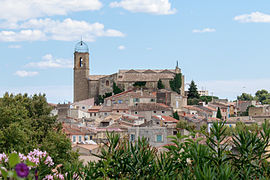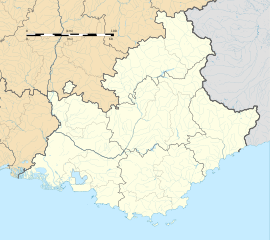You can help expand this article with text translated from the corresponding article in French. (December 2008) Click [show] for important translation instructions.
|
Istres (French pronunciation: [istʁ]; Occitan: Istre) is a commune in southern France, some 60 km (38 mi) northwest of Marseille. It is in the Provence-Alpes-Côte d'Azur region, in the Bouches-du-Rhône department, of which it is a subprefecture.
Istres | |
|---|---|
Subprefecture and commune | |
 Historic center | |
| Coordinates: 43°30′54″N 4°59′22″E / 43.51510°N 04.98950°E | |
| Country | France |
| Region | Provence-Alpes-Côte d'Azur |
| Department | Bouches-du-Rhône |
| Arrondissement | Istres |
| Canton | Istres |
| Intercommunality | Aix-Marseille-Provence |
| Government | |
| • Mayor (2020–2026) | François Bernardini[1] |
Area 1 | 113.73 km2 (43.91 sq mi) |
| Population (2021)[2] | 44,577 |
| • Density | 390/km2 (1,000/sq mi) |
| Time zone | UTC+01:00 (CET) |
| • Summer (DST) | UTC+02:00 (CEST) |
| INSEE/Postal code | 13047 /13800 |
| Elevation | 0–120 m (0–394 ft) (avg. 20 m or 66 ft) |
| 1 French Land Register data, which excludes lakes, ponds, glaciers > 1 km2 (0.386 sq mi or 247 acres) and river estuaries. | |
Location
editIstres is adjacent to the Étang de Berre lagoon (the largest in Europe) and the Étang de l'Olivier lagoon. It is located some 60 km (38 mi) north-west of Marseille, 20 km (13 mi) south-west of Salon-de-Provence, 10 km (6 mi) north of Martigues and 45 km (28 mi) south-east of Arles. Istres is also adjacent to the plaine de la Crau and the Camargue national park.
Sports
editThe city has numerous sports facilities and exactly 102 clubs. Each year, a race is organized around the Étang de l'Olivier. Many runners participate. The town's main football club is FC Istres.
Facilities
editIstres is the home of the Istres-Le Tubé Air Base (BA 125). This air base was one of three utilized by NASA as a contingency landing site for the Space Shuttle in the case of a Transoceanic Abort Landing.[3] Istres shared this responsibility with Zaragoza, Spain and Moron, Spain.
Climate
editIstres has a Mediterranean climate characterised by mild, humid winters and hot, dry summers. January and February are the coldest months, averaging temperatures of around 7 °C. July and August are the hottest months. The mean summer temperature is around 24 °C (75 °F) with an average maximum temperature around 32 °C. The amount of precipitation is around 566 mm (22 inches) per year. The mistral, a cold and often violent wind, blows through the city mostly in winter and spring.
| Climate data for Istres (1981–2010 averages, extremes 1920–present) | |||||||||||||
|---|---|---|---|---|---|---|---|---|---|---|---|---|---|
| Month | Jan | Feb | Mar | Apr | May | Jun | Jul | Aug | Sep | Oct | Nov | Dec | Year |
| Record high °C (°F) | 21.0 (69.8) |
23.3 (73.9) |
26.0 (78.8) |
29.8 (85.6) |
34.5 (94.1) |
44.3 (111.7) |
39.5 (103.1) |
39.8 (103.6) |
34.9 (94.8) |
30.9 (87.6) |
25.2 (77.4) |
20.3 (68.5) |
44.3 (111.7) |
| Mean daily maximum °C (°F) | 11.2 (52.2) |
12.4 (54.3) |
15.6 (60.1) |
18.3 (64.9) |
22.5 (72.5) |
27.1 (80.8) |
30.2 (86.4) |
29.8 (85.6) |
25.4 (77.7) |
20.6 (69.1) |
14.8 (58.6) |
11.6 (52.9) |
20.0 (68.0) |
| Daily mean °C (°F) | 7.0 (44.6) |
7.8 (46.0) |
10.7 (51.3) |
13.3 (55.9) |
17.4 (63.3) |
21.5 (70.7) |
24.6 (76.3) |
24.2 (75.6) |
20.3 (68.5) |
16.3 (61.3) |
10.8 (51.4) |
7.7 (45.9) |
15.2 (59.4) |
| Mean daily minimum °C (°F) | 2.8 (37.0) |
3.2 (37.8) |
5.7 (42.3) |
8.3 (46.9) |
12.2 (54.0) |
16.0 (60.8) |
18.9 (66.0) |
18.6 (65.5) |
15.3 (59.5) |
11.9 (53.4) |
6.9 (44.4) |
3.8 (38.8) |
10.3 (50.5) |
| Record low °C (°F) | −11.1 (12.0) |
−13.6 (7.5) |
−7.2 (19.0) |
−1.4 (29.5) |
3.1 (37.6) |
6.7 (44.1) |
9.0 (48.2) |
9.6 (49.3) |
5.1 (41.2) |
−2.0 (28.4) |
−4.9 (23.2) |
−12.6 (9.3) |
−13.6 (7.5) |
| Average precipitation mm (inches) | 53.9 (2.12) |
36.2 (1.43) |
33.9 (1.33) |
53.1 (2.09) |
42.2 (1.66) |
25.7 (1.01) |
10.2 (0.40) |
26.5 (1.04) |
76.8 (3.02) |
84.8 (3.34) |
60.2 (2.37) |
50.8 (2.00) |
554.3 (21.82) |
| Average precipitation days (≥ 1.0 mm) | 5.2 | 4.3 | 4.2 | 5.9 | 4.7 | 3.3 | 1.4 | 2.6 | 4.3 | 6.1 | 6.1 | 5.5 | 53.5 |
| Average snowy days | 0.8 | 0.8 | 0.3 | 0.0 | 0.0 | 0.0 | 0.0 | 0.0 | 0.0 | 0.0 | 0.1 | 0.8 | 2.8 |
| Average relative humidity (%) | 74 | 71 | 67 | 65 | 65 | 63 | 59 | 62 | 69 | 73 | 73 | 75 | 68 |
| Source 1: Meteo France[4] | |||||||||||||
| Source 2: Infoclimat.fr (humidity and snowy days 1961–1990)[5][6] | |||||||||||||
Population
edit
|
| ||||||||||||||||||||||||||||||||||||||||||||||||||||||||||||||||||||||||||||||||||||||||||||||||||||||||||||||||||
| |||||||||||||||||||||||||||||||||||||||||||||||||||||||||||||||||||||||||||||||||||||||||||||||||||||||||||||||||||
| Source: EHESS[7] and INSEE (1968-2017)[8] | |||||||||||||||||||||||||||||||||||||||||||||||||||||||||||||||||||||||||||||||||||||||||||||||||||||||||||||||||||
See also
editReferences
edit- ^ "Répertoire national des élus: les maires" (in French). data.gouv.fr, Plateforme ouverte des données publiques françaises. 4 May 2022.
- ^ "Populations légales 2021" (in French). The National Institute of Statistics and Economic Studies. 28 December 2023.
- ^ "France to assist NASA with the future launches of the Space Shuttle". Archived from the original on 25 January 2022. Retrieved 27 September 2009.
- ^ "Istres (13)" (PDF). Fiche Climatologique: Statistiques 1981–2010 et records (in French). Meteo France. Archived from the original (PDF) on 5 April 2018. Retrieved 5 April 2018.
- ^ "Normes et records 1961-1990: Istres - Le Tubé (13) - altitude 23m" (in French). Infoclimat. Archived from the original on 15 March 2016. Retrieved 5 April 2018.
- ^ "45,9°C : Un record en questions".
- ^ Des villages de Cassini aux communes d'aujourd'hui: Commune data sheet Istres, EHESS (in French).
- ^ Population en historique depuis 1968, INSEE
External links
edit



